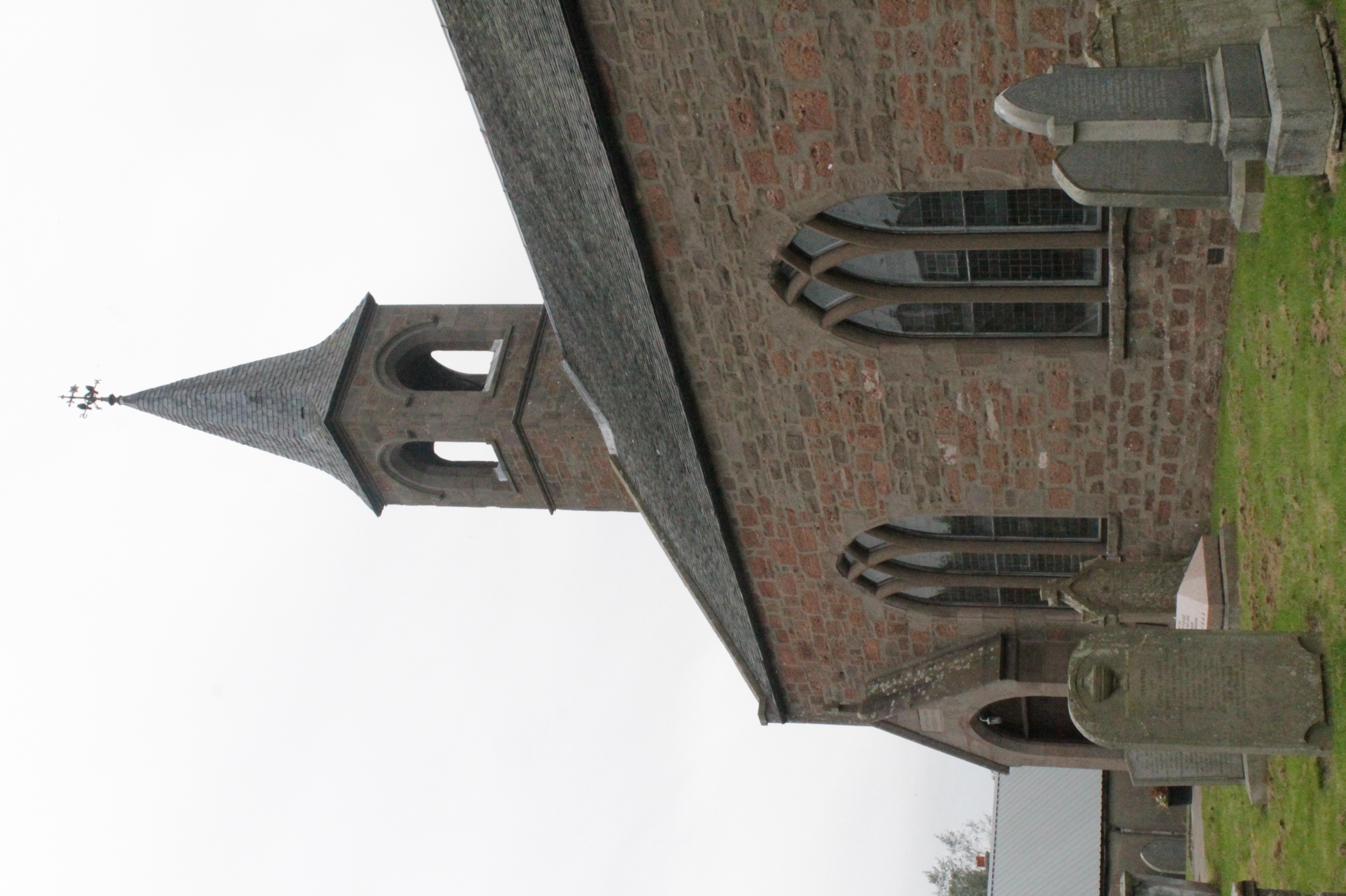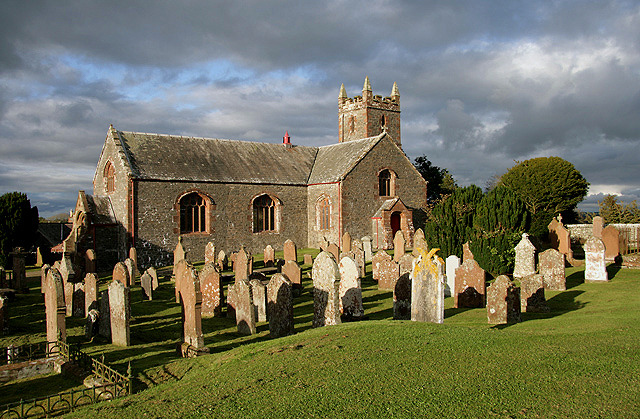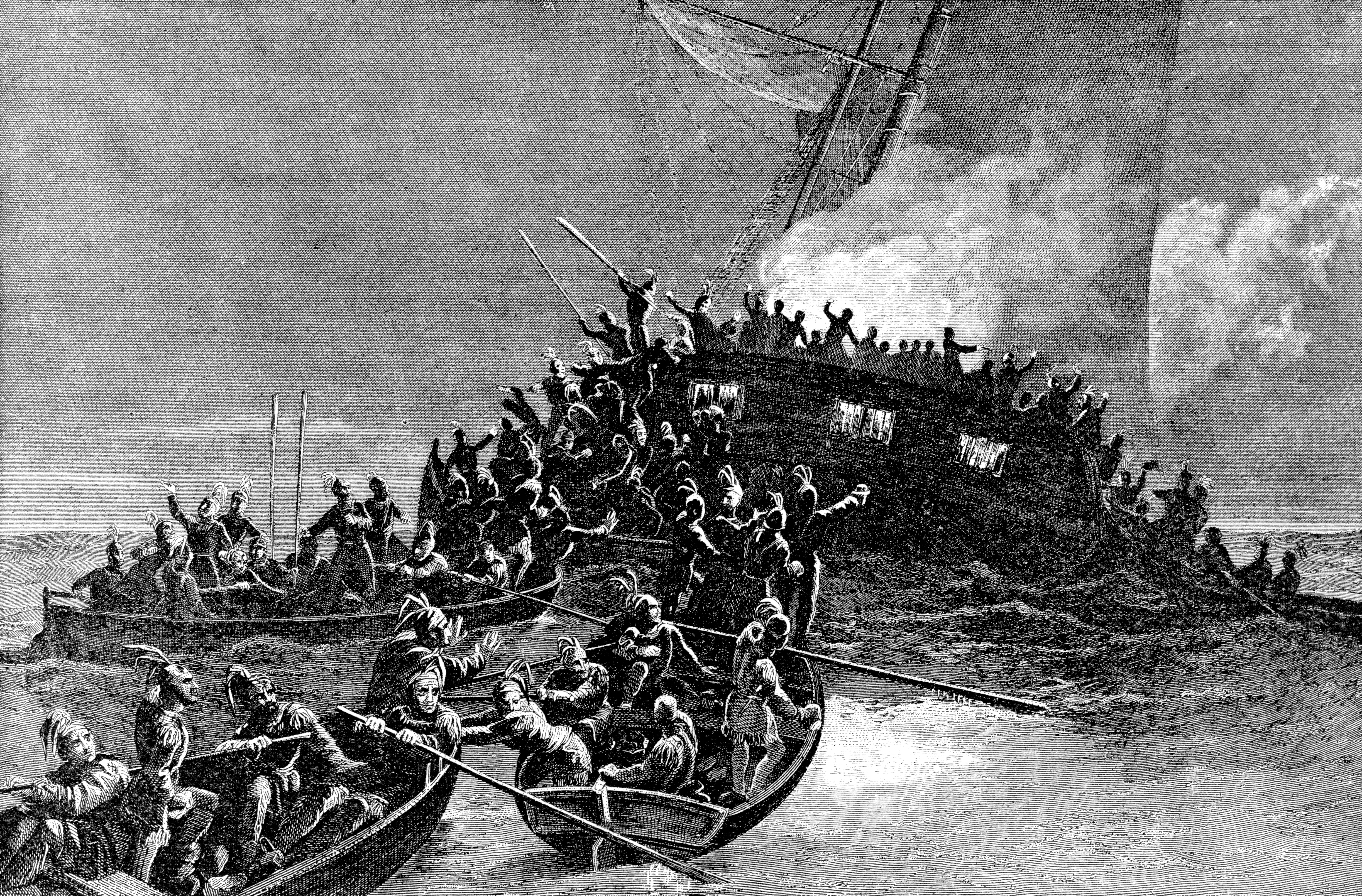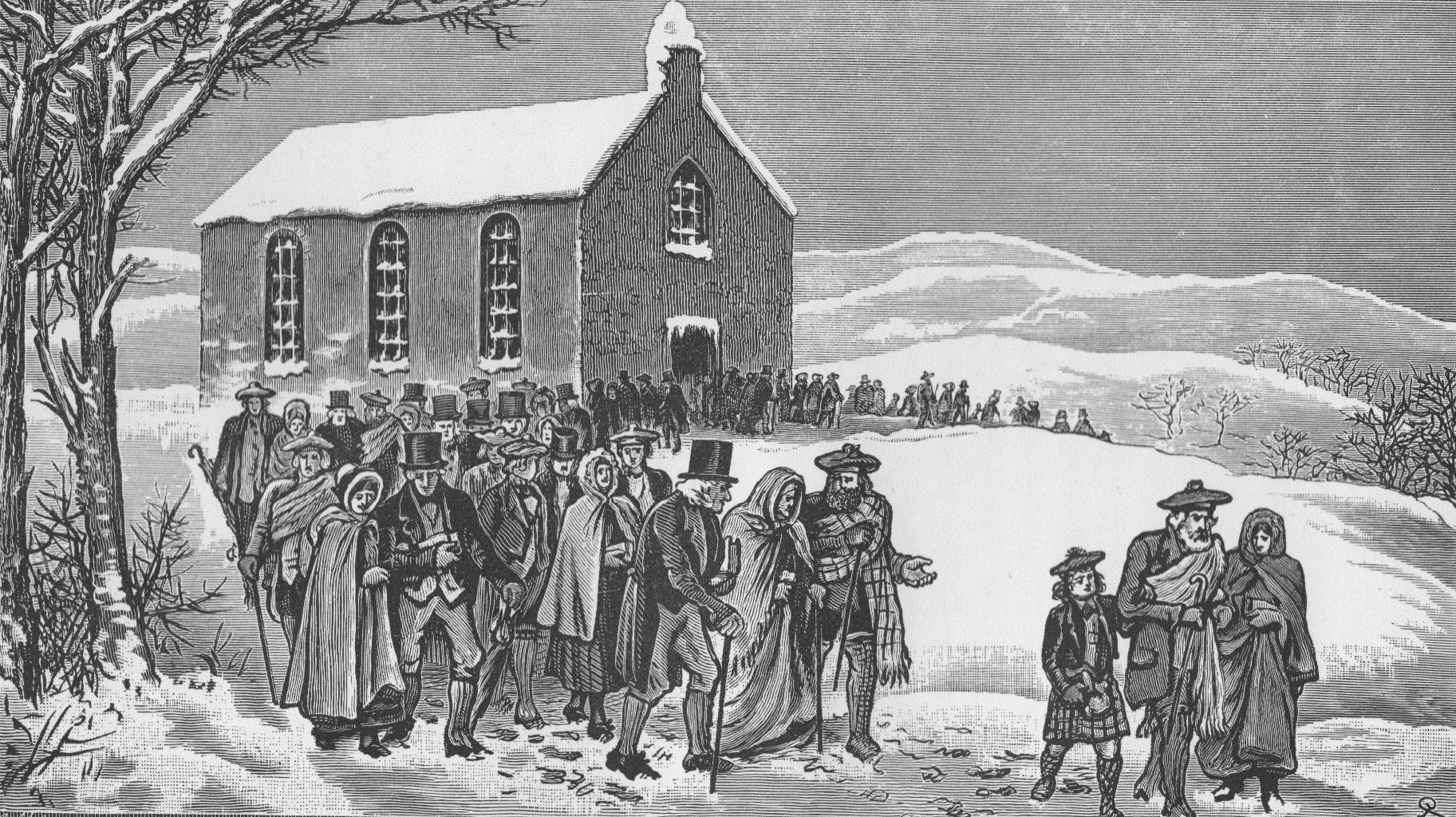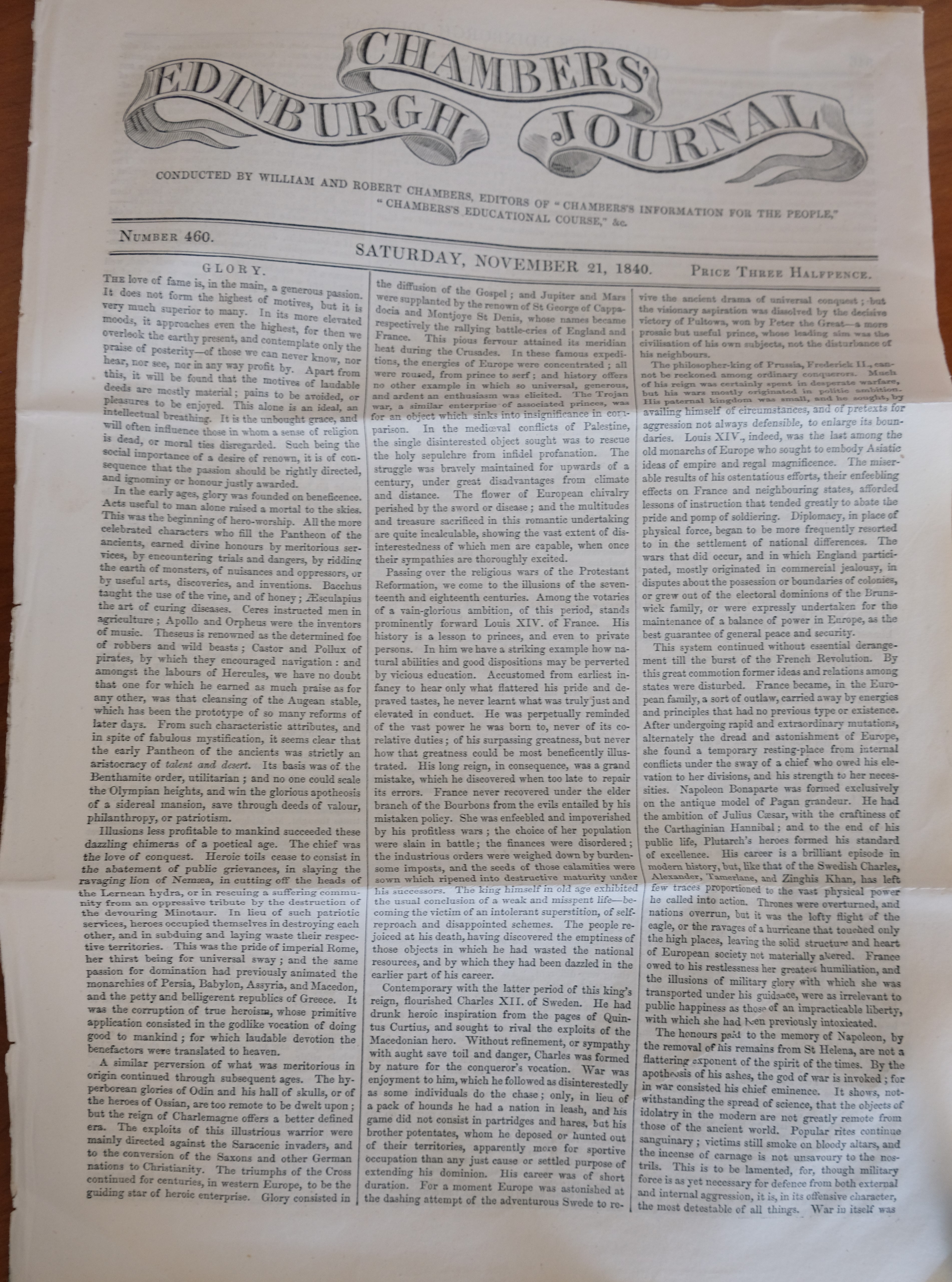|
George Cook (Scottish Minister)
George Cook (1772–1845) was a Scottish minister, author of religious tracts and professor of Moral Philosophy at St Andrews University. He served as Moderator of the Church of Scotland in 1825. He was the leader of the "moderate" party in the church of Scotland on the question of the Church Patronage (Scotland) Act 1874 (37 & 38 Vict. c. 82), which led to Disruption of 1843 and the formation of the Free Church of Scotland (1843–1900), Free Church by the "evangelical party. Professional life He was born on 22 March 1772 in Newburn, Fife the son of John Cook (professor, born 1739), John Cook (1739–1815) and Janet Hill. His mother was the sister of George Hill (minister), George Hill and daughter of John Hill, minister of St Andrews. George Cook studied at St Andrews University graduating from MA in 1790. He received a licence to minister on 30 April 1795 and the following year took over in the parish of Laurencekirk where he was ordained on 3 September 1795. In 1829 he was ... [...More Info...] [...Related Items...] OR: [Wikipedia] [Google] [Baidu] |
George Cook (moderator 1876)
George Cook (1812–1888) was a minister of the Church of Scotland, who served as Moderator of the General Assembly in 1876. He was part of the "Cook Dynasty" (mainly centred in St Andrews) and both his father and brother also served as Moderator. Life He was born in the manse of Laurencekirk on 11 June 1812 the son of George Cook (Scottish minister), George Cook who served as Moderator in 1825 and was later Professor of Moral Philosophy at St Andrews University. He was educated at Laurencekirk parish school then studied divinity at St Andrews University graduating MA around 1832. He was licensed to preach by the Presbytery of St Andrews in 1836. His first clergical role was as assistant to James MacDonald at Kemback. In 1841, as part of the Church's Foreign Missions projects, he was ordained as a Church of Scotland Chaplain in Bombay in India. After 20 years in India he returned to Scotland as minister of Bathgate Parish Church. In May 1867 he translated to Borgue, Dumfries and ... [...More Info...] [...Related Items...] OR: [Wikipedia] [Google] [Baidu] |
Thomas Chalmers
Thomas Chalmers (17 March 178031 May 1847), was a Scottish Presbyterian minister, professor of theology, political economist, and a leader of both the Church of Scotland and of the Free Church of Scotland (1843—1900), Free Church of Scotland. He has been called "Scotland's greatest nineteenth-century churchman". He served as Vice-president of the Royal Society of Edinburgh from 1835 to 1842. The New Zealand town of Port Chalmers was named after Chalmers. A bust of Chalmers is on display in the Hall of Heroes of the National Wallace Monument in Stirling. The Thomas Chalmers Centre in Kirkliston is named after him. Early life He was born at Anstruther in Fife, the son of Elizabeth Hall and John Chalmers, a merchant. Age 11 Chalmers attended the University of St Andrews studying mathematics. In January 1799 he was licensed as a preacher of the gospel by the St Andrews presbytery. In May 1803, after attending further courses of lectures at the University of Edinburgh, and ... [...More Info...] [...Related Items...] OR: [Wikipedia] [Google] [Baidu] |
1845 Deaths
Events January–March * January 1 – The Philippines began reckoning Asian dates by hopping the International Date Line through skipping Tuesday, December 31, 1844. That time zone shift was a reform made by Governor–General Narciso Claveria on August 16, 1844, in order to align the local calendars in the country with the rest of Asia as trade interests with Imperial China, Dutch East Indies and neighboring countries increased, after Mexico became independent in 1821. The reform also applied to Caroline Islands, Guam, Marianas Islands, Marshall Islands, and Palau as part of the Captaincy General of the Philippines. * January 10 – Elizabeth Barrett receives a love letter from the younger poet Robert Browning; on May 20, they meet for the first time in London. She begins writing her ''Sonnets from the Portuguese''. * January 23 – The United States Congress establishes a uniform date for federal elections, which will henceforth be held on the first Tuesday after the ... [...More Info...] [...Related Items...] OR: [Wikipedia] [Google] [Baidu] |
1772 Births
Events January–March * January 10 – Shah Alam II, the Mughal Emperor of India, makes a triumphant return to Delhi 15 years after having been forced to flee. * January 17 – Johann Friedrich Struensee and Queen Caroline Matilda are arrested, leading to his execution and her banishment from Denmark. * February 12 ** Breton-French explorer Yves-Joseph de Kerguelen-Trémarec discovers the uninhabited Kerguelen Islands in the Southern Indian Ocean. ** The Virginia Assembly amends an act to describe the punishments for the practice of gouging. * February 17 – The First Partition of Poland is agreed to by Russia and Prussia, later including Austria. * March 8 – Biela's Comet is first discovered by French astronomer Jacques Leibax Montaigne, but not proven to be a periodic comet until 1826, when Wilhelm von Biela correctly identifies its return. * March 20 – Pedro Fages, the Spanish Governor of Alta California, and Juan Crespí, a Cath ... [...More Info...] [...Related Items...] OR: [Wikipedia] [Google] [Baidu] |
Rachel Scott
Rachel Joy Scott (August 5, 1981 – April 20, 1999) was an American student who was the first fatality of the Columbine High School massacre, during which 13 other students and a teacher were also murdered by Eric Harris and Dylan Klebold, who then committed suicide. Scott has been revered by groups of evangelical Christians as a Christian martyr, although the circumstances surrounding her death and martyrdom have been disputed. She posthumously was the subject and co-writer of several books, and also was the inspiration for Rachel's Challenge, an international school outreach program and the most popular school assembly program in the U.S. The aim of Rachel's Challenge is to advocate Scott's values, based on her life, her journals, and the contents of a two-page essay, penned a month before her murder, entitled ''My Ethics; My Codes of Life''. This essay advocates her belief in compassion being "the greatest form of love humans have to offer". Early life Childhood Rachel Jo ... [...More Info...] [...Related Items...] OR: [Wikipedia] [Google] [Baidu] |
John Cook (moderator 1816)
John Cook (24 November 1771–28 November 1824) was a Scottish minister, historian and amateur artist. He was a pioneer in the field of Biblical Criticism. Life He was born on 24 November 1771 in St Andrews, the first son of John Cook (professor, born 1739), John Cook and his wife, Janet Hill, sister of George Hill (minister), George Hill. He was the first of 12 children. His birthdate is sometimes shown in records as 1771 to disguise his birth being less than 9 months after his parents' marriage. He studied Divinity at St Andrews University under his father and was licensed to preach by the Church of Scotland. In 1793 he became minister of Kilmany. A technically skilled album of his drawings (mainly townscapes in St Andrews) from 1797 is in the possession of the University of St Andrews. In 1802 he was appointed Professor of Hebrew at St Andrews University. He was later given the first university Chair in Biblical Criticism (1808-1824). He died in St Andrews on 28 Novem ... [...More Info...] [...Related Items...] OR: [Wikipedia] [Google] [Baidu] |
Alexander Hill (minister)
Alexander Hill (1785–1867) was a Scottish minister of the Church of Scotland who served as Moderator of the General Assembly of the Church of Scotland in 1845. He was professor of divinity at the University of Glasgow. Life Hill was born in St Andrews, Fife on 19 July 1785, one of eleven children of Harriet Scott and Rev George Hill, Principal of the University of St Andrews. He studied at the University of St Andrews graduating with an MA in 1804. In September 1806, he was licensed to preach as a Church of Scotland minister by the Presbytery of St Andrews. He spent nine years travelling in England and Europe, taking various tutoring jobs. In July 1815 he was ordained as minister of Colmonell translating to Dailly in 1816 (both in South Ayrshire). He was awarded a Doctor of Divinity in 1828 by St Andrews. From 1839 to 1863 he was Professor of Divinity at the University of Glasgow. In 1840 he was proposed as Moderator of the General Assembly of the Church of Scotland but ... [...More Info...] [...Related Items...] OR: [Wikipedia] [Google] [Baidu] |
John Hill (classicist)
John Hill FRSE (27 April 1747 – 7 December 1805) was a Scottish minister and Professor of Humanity at the University of Edinburgh. In 1783 he was one of the joint founders of the Royal Society of Edinburgh. Life He was born in St Andrews on 27 April 1747 the son of Rev John Hill (d. 1764), minister of St Andrews, and his wife Elizabeth Gowdie, daughter of John Gowdie. His mother died at or soon after his birth. His father remarried and had more children, including George Hill. He attended St Andrews Grammar School then the University of St Andrews where he graduated MA around 1767. From 1775 until 1793 he was joint Professor of Humanity at the University of St Andrews. The University of Edinburgh awarded him an honorary doctorate (LLD) in 1787. He then moved to the University of Edinburgh as the sole Professor of Humanity. His final years were spent at Brown SquareEdinburgh and Leith Post Office Directories 1800–1805 in Edinburgh where he died on 7 December 1805. He is ... [...More Info...] [...Related Items...] OR: [Wikipedia] [Google] [Baidu] |
George Cook (moderator)
George Cook (1812–1888) was a minister of the Church of Scotland, who served as Moderator of the General Assembly in 1876. He was part of the "Cook Dynasty" (mainly centred in St Andrews) and both his father and brother also served as Moderator. Life He was born in the manse of Laurencekirk on 11 June 1812 the son of George Cook (Scottish minister), George Cook who served as Moderator in 1825 and was later Professor of Moral Philosophy at St Andrews University. He was educated at Laurencekirk parish school then studied divinity at St Andrews University graduating MA around 1832. He was licensed to preach by the Presbytery of St Andrews in 1836. His first clergical role was as assistant to James MacDonald at Kemback. In 1841, as part of the Church's Foreign Missions projects, he was ordained as a Church of Scotland Chaplain in Bombay in India. After 20 years in India he returned to Scotland as minister of Bathgate Parish Church. In May 1867 he translated to Borgue, Dumfries and ... [...More Info...] [...Related Items...] OR: [Wikipedia] [Google] [Baidu] |
John Cook (Haddington)
John Cook (1807–1874) was a Scottish minister who served as Moderator of the General Assembly of the Church of Scotland for the year 1866/67. In common with other members of the ecclesiastical family of Cook, he was a strong supporter of the moderate party in the Scottish church. Life John Cook was born in Laurencekirk on 12 September 1807. He was the eldest son of George Cook (1772–1845) the local minister (afterwards Professor of Moral Philosophy at St Andrews), and his wife, Diana Shank. He was educated at Laurencekirk Parish School and the University of St Andrews. He was one of several children including George Cook, minister of Borgue. John followed in the family tradition and studied Divinity at St Andrews University. He graduated with an MA in 1823 and was licensed by the Presbytery of Fordoun on 17 September 1828. Initially he worked as an assistant to his father. In 1827 his father served as Moderator of the General Assembly of the Church of Scotland following i ... [...More Info...] [...Related Items...] OR: [Wikipedia] [Google] [Baidu] |
Robert Chambers (publisher Born 1802)
Robert Chambers (; 10 July 1802 – 17 March 1871) was a Scottish publisher, geologist, evolutionary thinker, author and journal editor who, like his elder brother and business partner William Chambers, was highly influential in mid-19th-century scientific and political circles. Chambers was an early phrenologist in the Edinburgh Phrenological Society. He was also the anonymous author of '' Vestiges of the Natural History of Creation'', which was so controversial that his authorship was not acknowledged until after his death. Early life Chambers was born in Peebles in the Scottish Borders 10 July 1802 to Jean Gibson (''c''. 1781–1843) and James Chambers, a cotton manufacturer. He was their second son of six children. The town had changed little in centuries. The town had old and new parts, each consisting of little more than a single street. Peebles was mainly inhabited by weavers and labourers living in thatched cottages. His father, James Chambers, made his living as a c ... [...More Info...] [...Related Items...] OR: [Wikipedia] [Google] [Baidu] |
St Andrews Cathedral
The Cathedral of St Andrew (often referred to as St Andrews Cathedral) is a ruined cathedral in St Andrews, Fife, Scotland. It was built in 1158 and became the centre of the Medieval Catholic Church in Scotland as the seat of the Archdiocese of St Andrews and the Bishops and Archbishops of St Andrews. It fell into disuse and ruin after Catholic mass was outlawed during the 16th-century Scottish Reformation. It is currently a monument in the custody of Historic Environment Scotland. The ruins indicate that the building was approximately long, and is the largest church to have been built in Scotland. History Founding and development The cathedral was founded to supply more accommodation than the older church of St. Regulus (St. Rule) afforded. This older church, located on what became the cathedral grounds, had been built in the Romanesque style. Today, there remains the square tower, 33 metres (108 feet) high, and the quire, of very diminutive proportions. On a plan of t ... [...More Info...] [...Related Items...] OR: [Wikipedia] [Google] [Baidu] |
